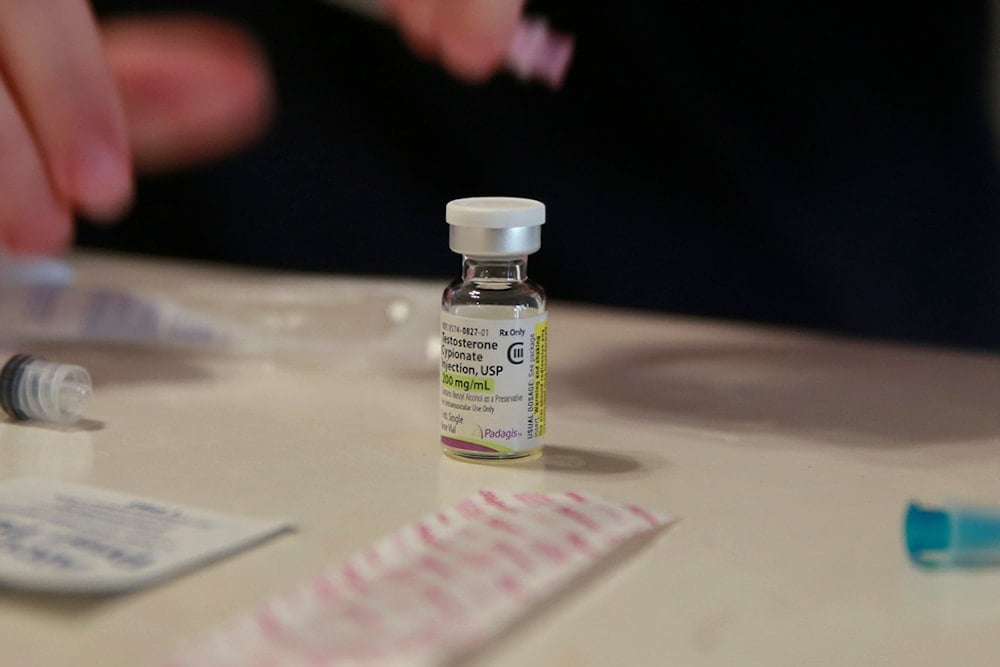UK social media driving demand for unneeded testosterone therapy
Doctors warn of rising NHS demand for testosterone therapy driven by misleading social media content promoting TRT for lifestyle and performance use.
-

A vial of testosterone is prepared for injection at a home in Florida, United States, on May 29, 2023. (AP Photo/Laura Bargfeld)
Doctors across the UK have raised concerns over a growing number of men seeking testosterone therapy through the National Health Service (NHS) despite lacking clinical need, a trend they attribute to social media misinformation.
Testosterone replacement therapy (TRT) is a prescription-only treatment reserved for men with clinically confirmed hormone deficiency, as outlined in national medical guidelines. Diagnosis requires persistent symptoms and repeated low testosterone levels confirmed by blood tests.
However, The Guardian states that clinicians say men are increasingly turning to NHS services after being influenced by viral content on platforms like TikTok and Instagram, where TRT is marketed as a lifestyle or performance-enhancing solution for fatigue, low mood, or reduced libido.
Read more: Prescribing of testosterone for UK middle-aged women ’out of control’
On social platforms, influencers are promoting blood tests as a gateway to testosterone therapy, often in collaboration with private clinics. Posts frame low motivation, aging, or lack of muscle mass as signs of “low T,” encouraging followers to get tested, and in many cases, start treatment.
In one video, a man lifting weights promotes discounted blood testing with the caption, “Get your testosterone tested … shoot me a DM for a £20 discount.” Another offers a free test giveaway, claiming it will help men “take control” of their performance.
Though it is illegal to advertise prescription medications in the UK, promoting blood tests is allowed. The Guardian flagged several of these promotional posts to the Advertising Standards Authority (ASA), which has launched an investigation into potential breaches.
Risks of taking testosterone without clinical need
The Guardian reports that doctors have cautioned against starting TRT without clinical justification, citing medical concerns over potential serious health risks, including infertility, cardiovascular issues, and mood disorders. Taking testosterone can suppress the body's natural hormone production, requiring additional medications to offset the disruption.
“The most worrying thing is these clinics are starting testosterone for men with normal testosterone levels," Professor Channa Jayasena of Imperial College London, chair of the Society for Endocrinology Andrology Network, told The Guardian. "There is no evidence that testosterone levels greater than 12 nmol/L are beneficial, and I have heard of clinics starting men below 18, which includes much of the population.”
Jayasena added that taking TRT without proper reasoning can lead to infertility, noting that "it suppresses the testicular and hormonal signals from the brain needed for the testicles to work, so clinics give a concoction of other drugs to stop that happening, the same approach used by anabolic steroid users.”
Read more: England’s hospitals may cut 100,000+ jobs amid cost-cutting directives
Private clinics and online testing under scrutiny
Jayasena told The Guardian that hospital specialists are seeing an increasing number of men who had private blood tests, often promoted on social media, and were incorrectly told they needed to begin testosterone therapy.
“At the national meeting, we asked 300 endocrinologists across the UK; everyone is seeing patients from these clinics every week,” he told The Guardian. “They are filling our clinics. We used to see people with adrenal problems and diabetes, and it’s really affecting NHS care. We are all asking how to deal with this.”
Jayasena told The Guardian that he had "just come back from a national teaching course for next-generation endocrinology consultants, and most people raised concerns about reproduction and this issue: a flurry of men being pushed to up-tick their testosterone.”
Experts call for tighter regulation an awareness
Once a niche medical treatment for men with a proven hormone deficiency, TRT is increasingly being reframed online as a cure-all for common health concerns, often with little scientific backing.
“There are specific clinical guidelines on who should and should not be started on testosterone," Jayasena stressed. "Certain symptoms, such as erectile dysfunction, are clearly associated with low testosterone. Other symptoms, like not having enough muscle or feeling depressed, are not associated with low testosterone. A man might say: ‘I’m not very muscly,’ and be told to get tested, but there’s no evidence he needs one.”

 4 Min Read
4 Min Read








